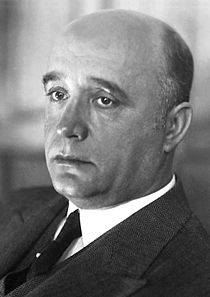Friedrich Bergius
| Friedrich Karl Rudolf Bergius | |
|---|---|
 |
|
| Born |
11 October 1884 Breslau (Wrocław), Germany |
| Died | 30 March 1949 (aged 64) Buenos Aires, Argentina |
| Nationality | Germany |
| Fields | Chemistry |
| Institutions | University of Hanover |
| Alma mater |
University of Breslau, University of Leipzig |
| Doctoral advisor |
Richard Abegg, Arthur Rudolf Hantzsch |
| Known for | Bergius process |
| Notable awards |
Nobel Prize for Chemistry (1931) Wilhelm Exner Medal (1937) |
Friedrich Karl Rudolf Bergius (11 October 1884 – 30 March 1949) was a German chemist known for the Bergius process for producing synthetic fuel from coal, Nobel Prize in Chemistry (1931, together with Carl Bosch) in recognition of contributions to the invention and development of chemical high-pressure methods. Having worked with IG Farben during World War II, his citizenship came into question following the war, causing him to ultimately flee to Argentina, where he acted as adviser to the Ministry of Industry.
Bergius was born near Breslau (Wrocław), within the German Empire's Prussian Province of Silesia.
Before studying chemistry, Bergius was sent to work for 6 months at the Friedrich Wilhelms steel works in Mülheim. His studies started at the University of Breslau in 1903 and ended with a PhD in chemistry at the University of Leipzig in 1907, after only 4 years. His thesis on sulfuric acid as solvent was supervised by Arthur Rudolf Hantzsch. In 1909 Bergius worked for one semester with Fritz Haber and Carl Bosch at the University of Karlsruhe in the development of the Haber-Bosch Process. On the same year he was invited to work at the University of Hanover with Max Bodenstein, who developed the idea of chemical kinetics and held a position as professor.
...
Wikipedia
